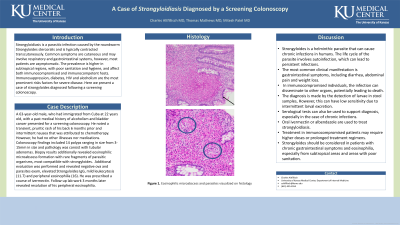Monday Poster Session
Category: Colon
P1686 - A Case of Strongyloidiasis Diagnosed by a Screening Colonoscopy
Monday, October 23, 2023
10:30 AM - 4:15 PM PT
Location: Exhibit Hall

Has Audio

Charlie Altfillisch, MD
University of Kansas Medical Center
Kansas City, KS
Presenting Author(s)
Charlie Altfillisch, MD1, Mitesh Patel, MD2, Thomas J.. Mathews, MD3
1University of Kansas Medical Center, Kansas City, KS; 2University of Kansas, Kansas City, KS; 3University of Kansas Medical Center, Kansas City, MO
Introduction: Strongyloidiasis is a parasitic infection caused by the roundworm Strongyloides stercoralis and is typically contracted transcutaneously. Common symptoms are cutaneous and may involve respiratory and gastrointestinal systems, however, most patients are asymptomatic. The prevalence is higher in subtropical regions, with poor sanitation and hygiene, and affect both immunocompromised and immunocompetent hosts. Immunosuppression, diabetes, HIV and alcoholism are the most prominent risks factors for severe disease. Here we present a case of strongyloides diagnosed following a screening colonoscopy.
Case Description/Methods: A 63-year-old male, who had immigrated from Cuba at 22 years old, with a past medical history of alcoholism and bladder cancer presented for a screening colonoscopy. He noted a transient, pruritic rash of his back 6 months prior and intermittent nausea that was attributed to chemotherapy. However, he had no other illnesses nor medications. Colonoscopy findings included 14 polyps ranging in size from 3-15mm in size and pathology was consist with tubular adenomas. Biopsy results additionally revealed eosinophilic microabscess formation with rare fragments of parasitic organisms, most compatible with strongyloides. Additional evaluation was performed and revealed negative ova and parasites exam, elevated Strongyloides IgG, mild leukocytosis (11.7) and peripheral eosinophilia (16). He was prescribed a course of ivermectin. Follow-up lab work 3 months later revealed resolution of his peripheral eosinophilia.
Discussion: Strongyloides is a parasite that can cause chronic infections in humans. The life cycle of the parasite involves autoinfection, which can lead to persistent infections. The most common clinical manifestation is gastrointestinal symptoms, including diarrhea, abdominal pain and weight loss. In immunocompromised individuals, the infection can disseminate to other organs, potentially leading to death. The diagnosis is made by the detection of larvae in stool samples, however, this can have low sensitivity due to intermittent larval excretion. Serological tests can also be used to support diagnosis, especially in the case of chronic infections. Oral ivermectin or albendazole are used to treat strongyloidiasis. Treatment in immunocompromised patients may require higher doses or prolonged treatment regimens. Strongyloides should be considered in patients with chronic gastrointestinal symptoms and eosinophilia, especially from subtropical areas and areas with poor sanitation.

Disclosures:
Charlie Altfillisch, MD1, Mitesh Patel, MD2, Thomas J.. Mathews, MD3. P1686 - A Case of Strongyloidiasis Diagnosed by a Screening Colonoscopy, ACG 2023 Annual Scientific Meeting Abstracts. Vancouver, BC, Canada: American College of Gastroenterology.
1University of Kansas Medical Center, Kansas City, KS; 2University of Kansas, Kansas City, KS; 3University of Kansas Medical Center, Kansas City, MO
Introduction: Strongyloidiasis is a parasitic infection caused by the roundworm Strongyloides stercoralis and is typically contracted transcutaneously. Common symptoms are cutaneous and may involve respiratory and gastrointestinal systems, however, most patients are asymptomatic. The prevalence is higher in subtropical regions, with poor sanitation and hygiene, and affect both immunocompromised and immunocompetent hosts. Immunosuppression, diabetes, HIV and alcoholism are the most prominent risks factors for severe disease. Here we present a case of strongyloides diagnosed following a screening colonoscopy.
Case Description/Methods: A 63-year-old male, who had immigrated from Cuba at 22 years old, with a past medical history of alcoholism and bladder cancer presented for a screening colonoscopy. He noted a transient, pruritic rash of his back 6 months prior and intermittent nausea that was attributed to chemotherapy. However, he had no other illnesses nor medications. Colonoscopy findings included 14 polyps ranging in size from 3-15mm in size and pathology was consist with tubular adenomas. Biopsy results additionally revealed eosinophilic microabscess formation with rare fragments of parasitic organisms, most compatible with strongyloides. Additional evaluation was performed and revealed negative ova and parasites exam, elevated Strongyloides IgG, mild leukocytosis (11.7) and peripheral eosinophilia (16). He was prescribed a course of ivermectin. Follow-up lab work 3 months later revealed resolution of his peripheral eosinophilia.
Discussion: Strongyloides is a parasite that can cause chronic infections in humans. The life cycle of the parasite involves autoinfection, which can lead to persistent infections. The most common clinical manifestation is gastrointestinal symptoms, including diarrhea, abdominal pain and weight loss. In immunocompromised individuals, the infection can disseminate to other organs, potentially leading to death. The diagnosis is made by the detection of larvae in stool samples, however, this can have low sensitivity due to intermittent larval excretion. Serological tests can also be used to support diagnosis, especially in the case of chronic infections. Oral ivermectin or albendazole are used to treat strongyloidiasis. Treatment in immunocompromised patients may require higher doses or prolonged treatment regimens. Strongyloides should be considered in patients with chronic gastrointestinal symptoms and eosinophilia, especially from subtropical areas and areas with poor sanitation.

Figure: Eosinophilic microabscess and parasites visualized on histology
Disclosures:
Charlie Altfillisch indicated no relevant financial relationships.
Mitesh Patel indicated no relevant financial relationships.
Thomas Mathews indicated no relevant financial relationships.
Charlie Altfillisch, MD1, Mitesh Patel, MD2, Thomas J.. Mathews, MD3. P1686 - A Case of Strongyloidiasis Diagnosed by a Screening Colonoscopy, ACG 2023 Annual Scientific Meeting Abstracts. Vancouver, BC, Canada: American College of Gastroenterology.
